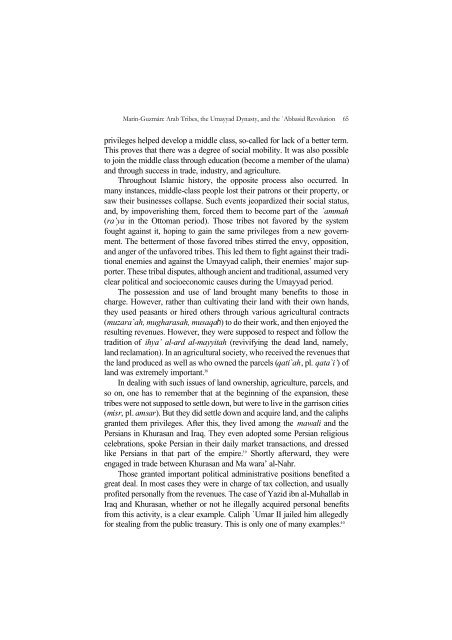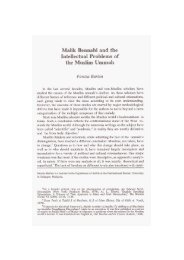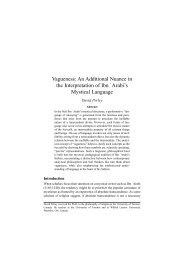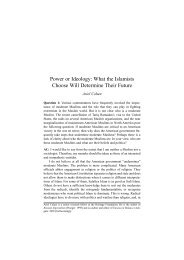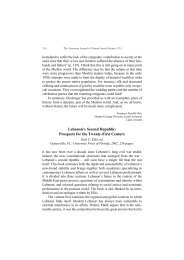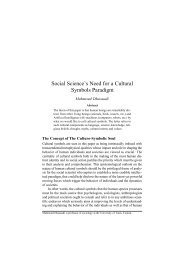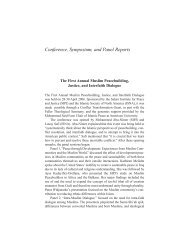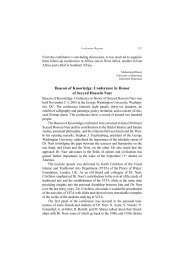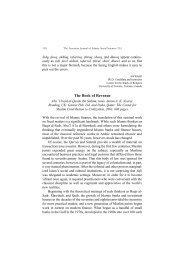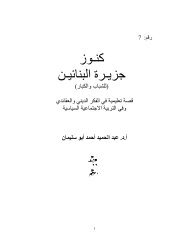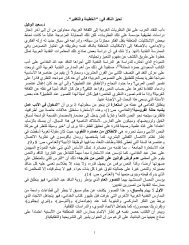Arab Tribes, the Umayyad Dynasty, and the `Abbasid ... - Epistemology
Arab Tribes, the Umayyad Dynasty, and the `Abbasid ... - Epistemology
Arab Tribes, the Umayyad Dynasty, and the `Abbasid ... - Epistemology
Create successful ePaper yourself
Turn your PDF publications into a flip-book with our unique Google optimized e-Paper software.
Marín-Guzmán: <strong>Arab</strong> <strong>Tribes</strong>, <strong>the</strong> <strong>Umayyad</strong> <strong>Dynasty</strong>, <strong>and</strong> <strong>the</strong> <strong>`Abbasid</strong> Revolution 65<br />
privileges helped develop a middle class, so-called for lack of a better term.<br />
This proves that <strong>the</strong>re was a degree of social mobility. It was also possible<br />
to join <strong>the</strong> middle class through education (become a member of <strong>the</strong> ulama)<br />
<strong>and</strong> through success in trade, industry, <strong>and</strong> agriculture.<br />
Throughout Islamic history, <strong>the</strong> opposite process also occurred. In<br />
many instances, middle-class people lost <strong>the</strong>ir patrons or <strong>the</strong>ir property, or<br />
saw <strong>the</strong>ir businesses collapse. Such events jeopardized <strong>the</strong>ir social status,<br />
<strong>and</strong>, by impoverishing <strong>the</strong>m, forced <strong>the</strong>m to become part of <strong>the</strong> `ammah<br />
(ra’ya in <strong>the</strong> Ottoman period). Those tribes not favored by <strong>the</strong> system<br />
fought against it, hoping to gain <strong>the</strong> same privileges from a new government.<br />
The betterment of those favored tribes stirred <strong>the</strong> envy, opposition,<br />
<strong>and</strong> anger of <strong>the</strong> unfavored tribes. This led <strong>the</strong>m to fight against <strong>the</strong>ir traditional<br />
enemies <strong>and</strong> against <strong>the</strong> <strong>Umayyad</strong> caliph, <strong>the</strong>ir enemies’ major supporter.<br />
These tribal disputes, although ancient <strong>and</strong> traditional, assumed very<br />
clear political <strong>and</strong> socioeconomic causes during <strong>the</strong> <strong>Umayyad</strong> period.<br />
The possession <strong>and</strong> use of l<strong>and</strong> brought many benefits to those in<br />
charge. However, ra<strong>the</strong>r than cultivating <strong>the</strong>ir l<strong>and</strong> with <strong>the</strong>ir own h<strong>and</strong>s,<br />
<strong>the</strong>y used peasants or hired o<strong>the</strong>rs through various agricultural contracts<br />
(muzara`ah, mugharasah, musaqah) to do <strong>the</strong>ir work, <strong>and</strong> <strong>the</strong>n enjoyed <strong>the</strong><br />
resulting revenues. However, <strong>the</strong>y were supposed to respect <strong>and</strong> follow <strong>the</strong><br />
tradition of ihya’ al-ard al-mayyitah (revivifying <strong>the</strong> dead l<strong>and</strong>, namely,<br />
l<strong>and</strong> reclamation). In an agricultural society, who received <strong>the</strong> revenues that<br />
<strong>the</strong> l<strong>and</strong> produced as well as who owned <strong>the</strong> parcels (qati`ah, pl. qata`i’) of<br />
l<strong>and</strong> was extremely important. 38<br />
In dealing with such issues of l<strong>and</strong> ownership, agriculture, parcels, <strong>and</strong><br />
so on, one has to remember that at <strong>the</strong> beginning of <strong>the</strong> expansion, <strong>the</strong>se<br />
tribes were not supposed to settle down, but were to live in <strong>the</strong> garrison cities<br />
(misr, pl. amsar). But <strong>the</strong>y did settle down <strong>and</strong> acquire l<strong>and</strong>, <strong>and</strong> <strong>the</strong> caliphs<br />
granted <strong>the</strong>m privileges. After this, <strong>the</strong>y lived among <strong>the</strong> mawali <strong>and</strong> <strong>the</strong><br />
Persians in Khurasan <strong>and</strong> Iraq. They even adopted some Persian religious<br />
celebrations, spoke Persian in <strong>the</strong>ir daily market transactions, <strong>and</strong> dressed<br />
like Persians in that part of <strong>the</strong> empire. 39 Shortly afterward, <strong>the</strong>y were<br />
engaged in trade between Khurasan <strong>and</strong> Ma wara’ al-Nahr.<br />
Those granted important political administrative positions benefited a<br />
great deal. In most cases <strong>the</strong>y were in charge of tax collection, <strong>and</strong> usually<br />
profited personally from <strong>the</strong> revenues. The case of Yazid ibn al-Muhallab in<br />
Iraq <strong>and</strong> Khurasan, whe<strong>the</strong>r or not he illegally acquired personal benefits<br />
from this activity, is a clear example. Caliph `Umar II jailed him allegedly<br />
for stealing from <strong>the</strong> public treasury. This is only one of many examples. 40


